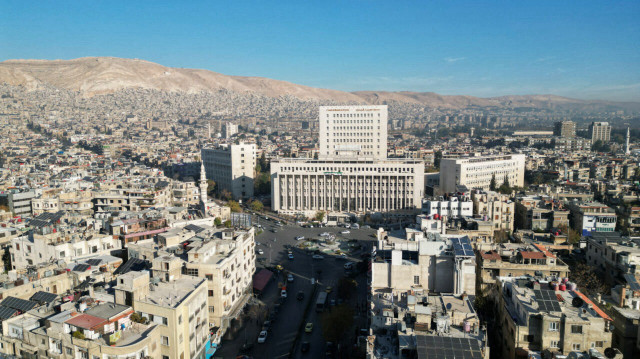
Sanctions targeted Assad and his regime, which no longer exists; thus, the sanctions on the new Syria should also be removed
For most people in the Middle East, the last noteworthy decision by the US concerning the region occurred around 70 years ago. In 1956, the US opposed the tripartite aggression by the UK, France, and Israel against Egypt, successfully pressuring the aggressors to resolve the crisis and withdraw their troops. Today, the US' image in the region is at an all-time low, perceived as complicit in enabling what many see as an Israeli genocide against the Palestinians in Gaza. With the exception of Ireland, Spain, and perhaps Belgium, the optics of European countries in the Middle East are not much better, particularly for Germany and the UK.
The recent toppling of the Assad regime by armed opposition groups on Dec. 8, 2024, offers the US and European countries a chance to reevaluate their approach and repair their reputation in the region. This moment calls for a reassessment of US and European policies, particularly concerning sanctions on Syria, the dismantling of the PKK/YPG terrorist group, and the withdrawal of US troops.
-Potential for new beginnings
The implications of Syria's ousted leader Bashar Assad's fall are profound, with the potential to strategically reshape Middle Eastern geopolitics for decades. Removing Assad cuts off Iran's ability to use Syria as a base for its expansionist ambitions. It may also deprive Moscow of its only military base on the Mediterranean, fundamentally altering regional power dynamics. To ensure that Iran does not regain its foothold, Russia cannot exploit military bases in Syria, and for millions of Syrian refugees and displaced citizens to return safely to their country, it is crucial to stabilize, unify, and rebuild the country while making it terror-free. Achieving these goals necessitates the removal of US and European sanctions on the new Syria.
Some Western experts advocate for the use of sanctions to impose a Western agenda on the new Syria, aiming to shape the transitional period according to their interests. This recommendation is dangerous; it could prompt similar actions by other nations, increase foreign interference, and create competing agendas that further destabilize Syria.
It is important to note that the armed opposition groups succeeded in toppling Assad and his backers – Iran and Russia – primarily because foreign interference was minimal during the decisive 11 days of their military campaign. This experience should serve as a lesson for all interested nations, urging them to refrain from interfering in Syria's internal affairs and focus instead on aiding the country, which would ultimately serve their interests in many ways.
The US must confront its negative role in Syria, particularly during the Obama administration, which inadvertently empowered Assad and his allies by overlooking their actions in pursuit of a nuclear deal with Iran (the JCPOA), as well as the separatist, Marxist-Leninist, PKK/YPG terror group. The Biden administration had considered lifting sanctions on the Assad regime until shortly before its collapse. Now is the right time for the US to atone for its past mistakes and compensate the Syrians by lifting sanctions on the new Syria.
On Jan. 6, 2025, the US Treasury issued a six-month general license authorizing certain transactions with the Syrian government, including energy sales. While this move is a step toward easing sanctions, it falls short of what is needed for genuine recovery and stability in Syria. Initially, the sanctions targeted Assad and his regime, which no longer exists; thus, the sanctions on the new Syria should also be removed. The economic conditions in Syria, exacerbated by years of conflict, have led to widespread poverty and food insecurity. Lifting sanctions would facilitate the importation of essential goods – food, medicine, and rebuilding materials – thereby alleviating civilian suffering and helping stabilize the situation. Removing sanctions would also attract international investment and aid, crucial for reconstruction and stabilization. Without removing sanctions, the risk of reigniting civil conflict increases, potentially allowing foreign interference and the recruitment of individuals for extremist and separatist agendas to fill the power vacuum.* Sanctions should be lifted for reconstructionIf sanctions remain in place, international aid organizations and businesses will face legal and financial risks that prevent them from engaging in reconstruction efforts. This would prolong Syria's recovery and lead to increased migration, further destabilizing the region. Refugees may find themselves trapped, unable to return home or remain in host countries, exacerbating their plight. Continued sanctions would perpetuate severe economic challenges, leading to widespread instability and humanitarian crises. The Syrian economy would become isolated, hindering recovery and development, fostering corruption, a black market, and rising inflation, which would push more citizens below the poverty line.
Moreover, maintaining sanctions would facilitate the resurgence of the former regime's drug trafficking networks along borders with Lebanon and Jordan, complicating security dynamics and enabling Iran and Hezbollah to exploit these networks for their goals. Ongoing economic hardship might drive individuals toward extremist groups, presenting an alternative to a state that fails to provide basic services, thereby increasing regional instability.
The US and Europe stand at a critical juncture in their Middle Eastern policy. By lifting sanctions and supporting the reconstruction of Syria, they would not only correct past mistakes but also pave the way for a more stable and prosperous region. The current situation in Syria offers the US and Europe a rare chance to rectify past mistakes and foster long-term stability in the Middle East.
*Opinions expressed in this article are the author's own and do not necessarily reflect Anadolu's editorial policy.

